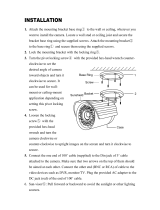11. Adjusting/Removing the Sunshield
NOTE: For indoor applications of the Sentinel, you may wish to leave the
sunshield removed for aesthetic reasons. Though it is not required for
normal operation of the Sentinel, the following instructions detail proper
adjustment/removal/installation of this sunshield.
1. ATTACHING SUNSHIELD -- Follow these steps if you wish to attach the
sunshield to the Sentinel:
a. Be sure that the sunshield bracket is firmly attached to the
Sentinel before attempting to attach the sunshield.
b. With the fluted fins on the sunshield toward the front of the cam-
era, line up the grooves on the sunshield with the flanges on the sun-
shield bracket and gently slide the sunshield back into the bracket.
c. Once the sunshield is in the desired position, tighten the 4mm
set screw located on the top and center of the sunshield using the
supplied 4mm Allen wrench. NOTE: To properly tighten the set
screw, turn until the screw starts to become tight then turn an
additional 3/4 turn.
2. ADJUSTMENT/REMOVAL -- With the supplied 4mm Allen wrench,
loosen the single (1) hex set screw on top of the sunshield. DO NOT REMOVE
THE SET SCREW. Generally, only half a turn or less is required to sufficiently
loosen the set screw for adjustment and/or removal of the sunshield.
a. ADJUSTMENT – With the set screw loose, gently move the sun-
shield back or forth to position, then re-tighten the thumbscrew with
the supplied 4mm Allen wrench. NOTE: To properly tighten the set
screw, turn until the screw starts to become tight then turn an
additional 3/4 turn.
11
CAUTION
Your IQ Sentinel sunshield is not captive
to the camera enclosure. Please be sure you
have the sunshield firmly in hand during
adjustment, installation and/or removal.



















